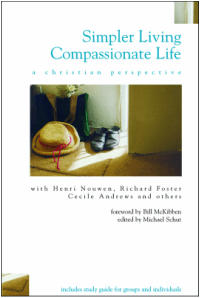To see a general overview of Simpler Living, Compassionate Life click here.
In this section (Social and Environmental Impacts of Everyday Food Choices): “The Pleasures of Eating by Wendell Berry (105-109); “The Great Hunter-Gatherer Continuum” by James T. Mulligan (110-116)
Berry begins this section by arguing that eating is an agricultural act that we, as consumers, have been disconnected from. The industrial economy has demanded higher quantities for lower cost and has left quality in product and experience behind. In this disconnection we also eat rushed food and lose not only the pleasure of eating but the pleasure of cooking.
The conclusion of this essay will be welcome for those who have been reading this work and appreciating the theoretical arguments, but wanting examples of action they can take. Berry gives seven suggestions for ways that readers can make their eating more responsible and enjoyable. Mulligan then places all the ways in which we gather food on a continuum from the most culturally normative to the most earth friendly. He argues for a move to the earth friendly side of the spectrum, buying from farmers markets and gardening, whenever possible. Both authors introduce accessible changes that readers can make to take a step away from cultural over-consumption and toward a more simple, earth friendly lifestyle.





